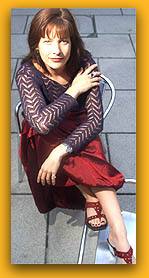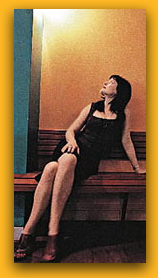
 |
 |
PROBE Kerry
Fox |
|
|
Rada: New Zealand's culture is influenced by, but different from, European culture. How has that culture affected you and your career? Kerry: New Zealand is a small place, and I think that it has close to four million people now, with an identity of being the end of the Earth. Which gives to the actor a certain identity of belonging to the island that supports other islands in Pacific. It's very wealthy since the 1950s and it's very rural, very, very beautiful and the attitude of the people is very relaxed. The influence of white culture has been there for a long time, and before that, this island suffered from isolation for a long time. And the people who lived here learned if you wanted to get anywhere in the world, you had to survive. You had to do it by yourself, as you were isolated, literally, and the culture reflects that. Of course, there is another significant culture which is Maori culture, which is a strong part of New Zealand's culture. And Maori culture is certainly a significant aspect of New Zealand culture. And I think that New Zealand is changing at the moment and when I go back I hear people's accents changing. When I left the Island, very few people spoke and understood Maori language, and now it's different. In the last 15 years, things have changed dramatically. You have Maori-speaking private schools, and tutors to learn the language, because this language had been squashed for many years before. Not only those changes had an effect on New Zealand; also, the fact that
New Zealand is so attached to Great Britain, isolated while thinking of
Britain as home. This attitude is changing, as well, as obviously America
has such a strong influence; but I think that New Zealand has much more
independence than it ever had before. Also, we have more women than any
other country in the world. Rada: Do you have any plans in the theatre right now? Kerry: I have worked in the theatre in the UK a few times now and it only happened in the last two or three years. I'm finding quite frustrated with theatre there, and I'm always questioning why the theatre is so frustrating. I think that theatre in the UK can be very small, small as the world can be small. People can be small-minded, and I've met some people who are not very inspiring in that sort of work, and I wanted to see the world and do things in the world and that's ok. But you know, I keep trying. Rada: How about the "Shallow Grave" cast? Was it all fun? Kerry: "Shallow Grave" was great. Because I'd worked
with Danny Boyle before and he's so enthusiastic about film and making
films, it was wonderful thing to do. And Ewan McGregor was so charming,
doing his first film. I found myself balancing between egos, between him
and the other actor. I've often found myself doing that, sort of balancing
between male egos. And you know that you are making such an exciting and
stylish and extremely well-designed piece of work, and you find yourself
feeling good. He was incredibly wanking arrogant in the way that he behaved,
when I think about it now. Rada: "Intimacy" brought you an award and "Shallow Grave" is something that you apparently loved, but how do you choose what to do and what not to do? How do you choose roles? Kerry: I'm always looking at my first and previous roles and I'm trying not to repeat myself. I'm looking for the roles that are going to challenge me and change me in a way. And I look at the character and the nature of the role in the film. Also, I'm looking at the people who are working on it. A combination of things. I don't know… I'm looking at the script and looking for the way to relate to the character, something that strikes me and I can't see always what makes it so different at first. And it doesn't mean that I always make the right choice. I don't know if I regret whether I turn down the part or not. Rada: How much did your first drama teacher influence you and your further career, that first experience in acting? Kerry: I think that the way I act is entirely to know what I know with people that I've worked with. I do believe in collaboration; I do believe in that. Something like that, "Intimacy," is the best work I've ever done. It's amazing, showing what I ought to do, or is it that best work I've ever done, you know. And I'm straightforward in a way, waiting for that film, realizing that I have a responsibility to the role, wanting to deliver the whole of myself, considering the role. And another responsibility while I was doing the role with Jane Campion, and another film that you probably never heard of. But it hasn't always been like that, squashing my ego, and being able to hear and understand everything that the director wanted and wants, being able to deliver it and act it. Without imitation, without my ego stopping me at any point. So I do my best to achieve essence, in many ways to reverse what people think that acting is. Lot of people think that acting is all about being egotistical and trading what you want to trade. So you know, I've come to ideas and possibilities but suddenly you want to cling to it desperately; you need to be able to reflect the main idea, be intuitive, and to be enthusiastic and responsive. You need to be able to work with people who are able to give you will to work, someone complicitly trusting, supportive, encouraging and trustworthy. Rada: Since you have been playing different characters, who is the real Kerry Fox? Kerry: That depends on my environment. I had to work hard to get it; I have a house in Sidney by the beach, and a flat there which I absolutely adore, but you know, that's what I am. I'm a beach bum, and when I'm there I have a very short day and I'm trying never to leave the beach, never going to a city. I think that I'm a very private person and my own intimacy, closed personality, is truly me. And I'm very fond of my private life, without journalists knocking on my door. I work very hard to make sure that people don't know what I'm really like, you know, so that I get more opportunities for the roles that I can play. And some directors don't know the real me and think that that is my real potential. |
||
|
Rada: Next projects? Kerry: The next one is called "Gallery." It's a thriller; it is almost finished now. And then I would like to stay in Australia to make a film called "Black and White," about a case in South Australia in the 1950s, when an aborigine man was charged with raping and killing a young white girl, and then how Rupert Murdoch, who is actually a goody in the movie, secures him a re-trial. Rada: How about an Australian that you would like to work with in the future? Kerry: Sam Neill. He was my absolute role model right from the start. 1 2 |
 |
|
|
|
||